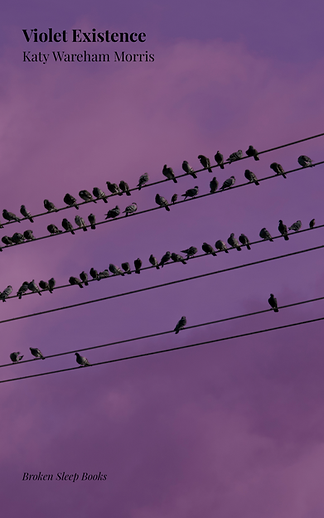
Violet Existence by Katy Wareham Morris
Broken Sleep Books, £6.50
(40 pages)
Sparking with electricity and a dextrous fluidity, this pamphlet takes the reader from the hospital ward to the hedgerow, and from Masterchef to Mother Nature’s ever-bubbling cauldron of destruction and rebirth.
This is done with a dynamic use of white space and textual play, employing erasure and prose poetry, as well as more ‘conventional’ forms on the page. In her first poem, Wareham Morris drags us, literally kicking and screaming, through the stages of Labour:
Her body
backfires into flamenco, she doesn’t know
flamenco.
This textual dance and hide and seek is deployed well in describing an experience as discombobulating as childbirth:
something forcedher eyes closed
how
much time?
before she sat up static-charged
A static charge is present throughout these poems, whether addressing female sexuality, gender roles, reality TV or the erotic physicality of our relationship with the Earth.
I wondered, whilst reading, if the title had been inspired by the Purple Earth Theory, a hypothesis that early photosynthetic life forms were based on the purple-hued retinal molecule rather than the more complex chlorophyll, making Earth appear purple rather than green. Certainly, the Wareham Morris’ work frequently conjures the colour, as well as its many connotations, but more than that, she examines her subjects, whether childbirth, feminism or ecological disaster with an X-ray vision, cutting through to the core of things.
In After the Horses the poet summons up word-sounds to articulate the horror and devastation of a world post-environmental collapse. It is also a poem ‘after’ Edwin Muir’s The Horses, in itself an existential premonition of nuclear holocaust:
“Seaswindsmeadowsweathers
swallowed by an unknown jaws
shrieking oratorio bluegreengreyhalo
fountains of blackblackblack
acidrainsrainsrains dissolved
every frost that there ever was”
There is a polyphony of moods and voices in Violet Existence, sometimes in discord, sometimes in harmony. Such as with the ambivalence expressed towards motherhood and womanhood. The tenderness of the repeated line “I will press your downy legs together” in Immediately after the terrorists set off their bombs is wonderfully contrasted with the lines almost dismissively, if not distastefully, spat out in An Advert For This Body:
“They were shuck from me.
I’m husk.
Frozen | a b a n d o n e d
by motherhood.”
Ultimately the poet chooses to end on a hopeful note, or perhaps a rallying cry. In the prose piece, Summer evening, before, Wareham Morris speculates on the shape of the world after the bees have gone: the loss of colour, of light, movement, life. She moves through time and memory:
I had forgotten the bees, the flowers, the grass, the rain. It did not feel like home or childhood.
Then she was therewaving in violet winds
tall
aubergine heather mulberry orchid […]ready to jig […]
Foxglove riff:
for now
namasteThey are the world.
Violet Existence is published by Broken Sleep Books and available here. Katy Wareham Morris is a writer and academic. You can find her website here.
JP Seabright (she/they) is a queer disabled writer living in London. They have two solo pamphlets published and two collaborations, encompassing poetry, prose and experimental work. You can find their website here, and find them on Twitter @errormessage.
